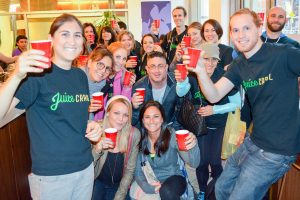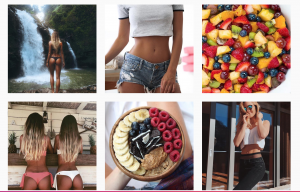BY TYLER CHOI
Here’s a sobering thought after those St. Patrick’s Day hangovers: millennials are increasingly likely to exercise self-control over their drinking, and prefer the refuge of non-alcohol related activities for recreation.
In contrast to the unflattering image of a booze-fuelled party machine, 75 per cent of millennials limit their alcohol consumption the majority of the time they go out, and 38 per cent say every time, according to a 2016 survey by Heineken. A study from the U.K. found only 48 per cent of youths aged 16 to 24 had a drink in the past week, compared to 66 per cent of middle-aged adults. Just what are millennials doing in lieu of the ultimate college pastime?

“It doesn’t feel like you need alcohol in a conversation to have fun,” says Kristian Leal, a Media Fundamentals student. Fun is no longer relegated to the realm of beer pong and binge drinking for college students, because alternatives have risen to take the mantle. Teetotaller parties and juice crawls have emerged in popularity, while board games and arcades have increasingly accompanied alcohol.
For Leal, he finds there is a greater push to meet over social media and bond over video games, rather than partying with a drink in hand. Netflix has become a major magnet, gluing millennials to their screens while they binge on the latest shows, keeping them away from public events. While alcohol remains a popular socializer, it’s no longer the cement for a party as it used to be.
Health consciousness has also sparked doubts about the classic college lifestyle. “I would say it’s not very fun [partying] because drinking a lot of alcohol isn’t good for you,” says Leal. It’s becoming increasingly common to see photos of health smoothies and fitness routines on Instagram and Facebook next to the ritzy cocktails and clubs frequented by celebrities. Millennials have been emphasizing fitness and a healthier lifestyle, and when coupled with their education in substance abuse, alcohol is no longer so chic.

In an interview with the Globe and Mail, Dr. Joanna Henderson, director of the McCain Centre for Child, Youth and Family Mental Health at the Center for Addiction and Mental Health, said young adults have grown more thoughtful about the consequences of alcohol, and accepting of unconventional choices.
Jake Aiton, an Interior Design student, can relate. “If one guy in a class said if they don’t drink or use drugs, no one judges them. I mean I wouldn’t.” Rather than spending Valentine’s Day on a bar crawl, Aiton spent the day with six friends at a sushi restaurant, and went home with no hangover.
Alcohol and partying is also likely not a priority for college and university millennials when juggling several burdens at once. It’s no secret that tuitions, living costs, and rent have skyrocketed over the years, along with a shrinking job market and ballooning career competition. It’s not easy to spend the night drinking when it can put a dent into your tuition repayment fund, or rent for the month.
Daniel Casey, Senior Manager of Operations at the Marquee and the Den says, “We’ve been noticing a bit of a downward trend on alcohol sales over the past few years – our food business has jumped considerably, but alcohol has stayed pretty flat overall. I think a lot of it has to do with evolving priorities and money – the disposable income just isn’t there, or they’re spending their money on other things. Tuition, rent, groceries, etc. have gotten more expensive, so spending habits are changing.”
“I don’t really have time for it,” Aiton says, referring to the stereotypical college lifestyle. On his peers, he says, “When they’re not on schoolwork, they’re working on portfolios, sleeping, or playing video games.”
Leal sympathizes, saying other burdens like his schoolwork have put a damper on his plans to go out. “I do like to party, but I don’t get any opportunity to feel like going. Like I’m going to get prevented.”
Millennials love their fun and alcohol, but they have proven an ability to divorce the two when necessary. The same Heineken survey found 71 per cent of those asked believe their life is better when they moderate their behaviour, and that just might be what millennials want. Casey notes blended drinks with no alcohol like daiquiris, margaritas, and piña coladas have caught on slowly, while Sheridan’s coffeehouses have grown significantly with specialty coffees, smoothies, and homemade Chai.
“Our overall business has grown a lot, but this is all pretty much attributed towards food,” says Casey. “Alcohol isn’t the focus it once was on our campus, and it’s a similar story at a lot of colleges and universities across the country.”
